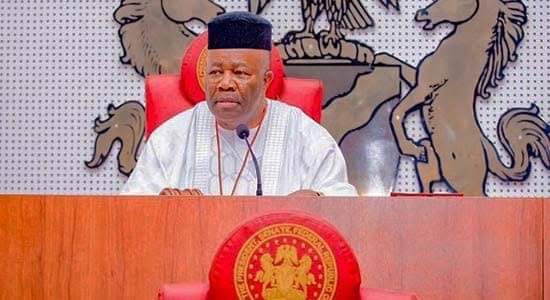How Buhari Regime Has Set The Stage For Another Military Rule In Nigeria – Adebayo Raphael
With chaos, Buhari’s chance to perpetuate himself in power is strengthened. Coups, as many like to argue these days, are antiquated; but the facts say there have been at least 25 coup attempts in Africa alone since 2010.
We often forget that the authoritarian personality has not vanished; he is always willing to exploit weak states and fatalistic people.
The road ahead is bumpy and rough, and Nigerians must prepare to either nip the latent threat in the bud or dance to the tune of what is to come.
Another Military Rule In Nigeria
It has been 28 years since the last coup d’état in Nigeria. The coup ushered in the late Sani Abacha, arguably the most brutal Big Brother in Nigeria’s torturous past with military dictators.
The current Fourth Republic has thus far been untainted by military coups – the singular bane which truncated the previous triplets of democratic republics after Independence.
Nigerians should prepare for another military regime.
Nigeria has one of the youngest population in Africa and the world – more than half of the population are below 20 years old and have never witnessed a military coup, nor do they have any inkling of what the world looks like under a military regime.
Another Military Rule In Nigeria
But the consequential misfortune, which is the Buhari regime, has set the stage for another military rule in Nigeria – and to argue otherwise is to disregard history and present realities in the country.
On 15 January 1966, after suspending the constitution and before dictating his “Extraordinary Orders of the Day”, Major Patrick Chukwuma Nzeogwu – the leader of the coup, said, “the aim of the Revolutionary Council is to establish a strong united and prosperous nation, free from corruption and internal strife.”
This intervention created the basis (underperformance in office) for toppling any government – democratic or military, in Nigeria – and that would define the country’s history for the next three decades.
Another Military Rule In Nigeria
Adebayo Raphael speaking at a public function.
Excerpts from the censorious Abacha speech of the 31 December 1983 coup, which installed Nigeria’s current president Muhammadu Buhari as Head of State, mentions “the intolerable conditions” of the time as justification for the coup, to wit:
“Our economy has been hopelessly managed. We have become a debtor and beggar nation. There is inadequacy of food at reasonable prices… Health services are in shambles as our hospitals are reduced to mere consulting clinics without drugs, water, and equipment.
Another Military Rule In Nigeria
“In some states, workers are being owed salary arrears of eight to twelve months and in others there are threats of salary cuts. Yet our leaders revel in squandermania, corruption and indiscipline…” the verbal onslaught went on.
There is nothing described in the 1983 speech that is not happening in monstrous proportions today. Every free soul knows that the state of security, the economy, and governance generally under Buhari’s watch is simply catastrophic.
The so-called Asaba Declaration of May 11 this year is proof that the failure of the Buhari regime can no longer be cosmeticized. In their dark corners, away from public glare, this reality has not escaped Buhari and his cronies, too. And that is why some of the befuddling incidents happening now should not be dismissed as mere accidents.
Another Military Rule In Nigeria
Over 23 Independent National Electoral Commission (INEC) offices have been torched since the last general elections, and about 12 of those happened in the last year. The slated date for the 2023 general elections is just a wee over six hundred days from now.
Political parties have already started firing salvos of critical words at each other because of these fire raids. If the situation persists, the regime will have an opportunity to either postpone the elections or worse. But the fire incidents are not the only piece in the web of scattered pieces before us.
Another Military Rule In Nigeria
Nigeria is considered a democratic country, but the leader of the Nigerian state is an authoritarian personality whose inherent nature has dotted every thinkable and notable aspect of our current social and political conditions.
When we pay more attention to this fact, the possibility of a more diabolical move that could bring an end to the fourth republic might become clearer.
We can start by asking why, among several critical areas for policy focus, the Buhari regime has intimidatingly focused on three major things.
Another Military Rule In Nigeria
First, the strategic placement of warm-blooded loyalists in top brass positions in public institutions – from the legislature and judiciary to the military, economy and so on – in absolute disregard of the Federal Character Principle.
The consequence of this is a state under the totalitarian capture of one man who, at whim, can decide what must be or not be. He gets to decide, through the supreme court, who wins elections –

even if the only legitimate witness to such dubiousness is a mere policeman – or whose bank account gets frozen during peaceful protests, or whose time in illegal detention is perpetuated, and so on.
Another Military Rule In Nigeria
At the same time, he has at his disposal a Senate President who has publicly pledged absolute fealty, and an invertebrate Speaker of House of Representatives with a lesser will than a robot. Then, we have the security agencies who are willing to commit all manners of atrocities and human rights violations in the name of ‘national security.’
They are ready to kill and maim or make anyone disappear for even the flimsiest pretexts. If they become subjects of the spotlight, they get protected with new positions with diplomatic immunity like that of a foreign ambassador, or something of that nature; and a new loyalist is recruited to continue the reign of terror.
Another Military Rule In Nigeria
Essentially Buhari has state institutions under his absolute command; not a single person to check his excesses – in the same way as Paul Biya, Ali Bongo or Alexander Lukashenko.
Perhaps, someone might argue that the constitutional design of the fourth republic gives too much latitude to any president to exert domineering influence on democratic and state institutions. The argument is valid.
Another Military Rule In Nigeria
It strengthens existing demands to review or replace the 1999 constitution. However, it does not excuse the capture of public institutions in the way Buhari has done, which is unprecedented in the history of the fourth republic and should raise alarms among the thoughtful.
Even under President Obasanjo’s regime not long ago – which I know some might present as a fitting precedent – the legislature, though not free from executive intimidation, defended the country’s democracy, and the judiciary did not fall behind when it mattered the most either.
Another Military Rule In Nigeria
The current state of affairs is such that those whom Buhari has strategically appointed or supported to superintend these crucial institutions have either publicly or privately declared absolute loyalty to him.
Wielding the captured institutions above, the second area of focus for the regime becomes clear with the continuing measures to delimit the right to freedom of expression, which since 2015 the regime has doggedly pursued as a policy, to the point that many actors in the Fourth Estate have been intimidated through the constant harassments of the press by security agencies and the extant New Broadcasting Code.
Another Military Rule In Nigeria
Many now publish stories or reports using the language approved by the regime, canonizing or demonizing those whom the regime deems worthy of either of the two.
The vibrant social media and overburdened civil society organizations, which have so far been a pain in the neck to the regime, are closer to being heavily crushed with the proposed Social Media and Hate Speech Bills, reminiscent of Buhari’s Decree 4 of the 1980s.
Another Military Rule In Nigeria
Another development is that of the retirement of senior officers in crucial security positions: In September 2018, roughly four months before the 2019 elections, Buhari appointed Yusuf Bichi (Northerner) as Director-General of the State Security Service (SSS), replacing Mathew Seyeifa (Southerner, earlier appointed by the VP in Buhari’s absence).
Seyeifa replaced Lawan Daura (Northerner) after he organized a siege on the National Assembly — a typical coup d’état move.
Another Military Rule In Nigeria
In 2016, Buhari appointed Ibrahim Kpotum Idris as Inspector General of Police (IGP) and compulsorily retired 22 senior officers in the process; in 2019, at least 7 officers of a higher rank were retired for former IGP Mohammed Adamu.
The recent tragic death of former Chief of Army Staff, Ibrahim Attahiru (Northerner) — who replaced Tukur Burutai (Northerner), has also led to the appointment of Major-General Farouk Yahaya (Northerner) as the new Chief of Army Staff — and at least 20 senior officers are likely to be retired as a result.
Another Military Rule In Nigeria
Why is this important? Nigeria’s history is marked with instances of compelled retirement or outright dismissal of high ranking officers for junior ones after a successful coup.
In 1984 Buhari and his treasonous military goons retired Senior Officers after their coup ousted Shagari’s democratic government. Something is certainly in the offing once again, perhaps something worse than whatever happened before the 2019 general elections.
Another Military Rule In Nigeria
The last policy of the regime – disunity and orchestrated chaos – is probably more controversial, yet no less likely and quite indicative of reverse psychology. It is either that or the regime is simply clueless.
But it is hard to argue that a man who was part of two coordinated coups d’état in the past, has nary an inkling when fault lines that could lead to more of such become the norm under his watch (especially when he has had a taste of it once) – except it is deliberate and part of an elaborate stratagem.
Another Military Rule In Nigeria
Even the Governor of Kogi State, Yahaya Bello, one of Buhari’s impassioned bootlickers, cited on Channels TV the goal of uniting the country as one of his reasons for vying for the presidency in 2023. This narrative is difficult to sustain if one does not already think the people are disunited.
The most strategically placed potential beneficiary of the monumental disorder in Nigeria now is the man who fought life and limb – contested four times (with threats of conflagration) – to become the Commander-in-Chief of the armed forces.
Another Military Rule In Nigeria
Unlike his regime in the 1980s, he has no internal opposition to his rule today, making his whims the same as that of the hierarchy of the military and other critical institutions. Worse, the omen around us is indicative of greater chaos as we approach 2023.
Days before the 2019 general elections, the Nigerian army announced that it would deploy 95% of its personnel for “internal security operations” during the entire election exercise.
Another Military Rule In Nigeria
The strategy obviously worked; not only were voters intimidated, but the results were also less than credible and certainly not free and fair. The time to double down on that strategy is here, and Buhari is likely to benefit from it.
With chaos, Buhari’s chance to perpetuate himself in power is strengthened. Coups, as many like to argue these days, are antiquated; but the facts say there have been at least 25 coup attempts in Africa alone since 2010.
Another Military Rule In Nigeria
We often forget that the authoritarian personality has not vanished; he is always willing to exploit weak states and fatalistic people.
The road ahead is bumpy and rough, and Nigerians must prepare to either nip the latent threat in the bud or dance to the tune of what is to come.
How Buhari regime has set the stage for another military rule in Nigeria. Kindly leave your comment on the comments section below.









































